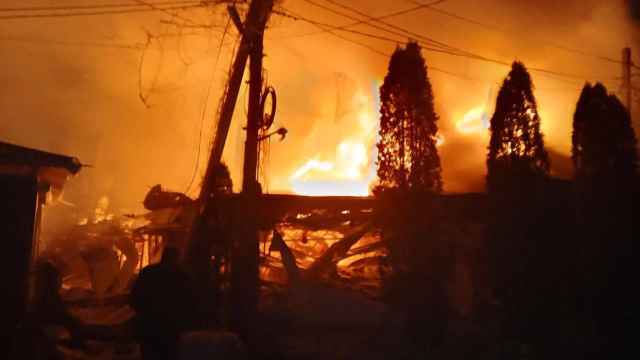All 35 people killed in last week's Domodedovo Airport bombing were identified within three days of the attack. But 12 long years after another horrific terrorist attack in Moscow, 12 victims remain unknown, their bodies stored in a morgue by authorities who haven't found the money to carry out the necessary DNA tests.
The unidentified victims died when a powerful explosion ripped through a nine-story apartment building on Ulitsa Guryanova in southeastern Moscow in September 1999, killing 100 people. The blast was one of several that destroyed apartment buildings in Russian cities that month, prompting the start of the second Chechen conflict.
Ninety-six body fragments belonging to the 12 slain people remain at the city's Lianozovo morgue, said Tatyana Karpova, head of Nord Ost, a group that supports victims of terrorist attacks.
Lawyers Igor Trunov and Mikhail Trepashkin, who represented families of the 1999 bombing, confirmed that body fragments remain unidentified, and Trunov said by telephone that city officials have explained that they have no money for DNA tests.
In fact, city officials demanded that relatives of those killed in the bombing pay for DNA tests using money they received as compensation from the state, Karpova said. Those who refused were unable to identify the bodies of their loved ones, she said.
"When you are grieving, they brazenly exploit you," Karpova said by telephone.
Moreover, many relatives were denied proper compensation, lawyer Trepashkin said. Those who were paid got meager sums of 5,000 to 10,000 rubles, Trunov said.
In comparison, a private Moscow firm is currently offering DNA tests for 12,000 to 16,000 rubles.
Three relatives of people killed in the 1999 bombing spoke of their grief over not finding the bodies in recent interviews with Moskovsky Komsomolets.
Lyudmila Knutova lost her 31-year-old son in the bombing and could not find him later among the dead, so an empty coffin was buried instead.
Tamara Gorbyleva lost her 4-year-old grandson, daughter and son-in-law, but only the daughter was identified.
Anna Pakhomova lost her father.
Two of them paid for DNA tests, and the third did a free-of-charge test, but none managed to identify their relatives among the body fragments examined during testing.
The presumed victims officially have been listed as missing. No official data is available for how many people are on this list after the blast.
Knutova, reached by phone, refused to talk, saying she did not want to "reopen old wounds."
Gorbyleva, a member of the Nord Ost group, also declined to comment.
No contacts for Pakhomova were available.
In the 12 years since the blast, no government agency has offered an explanation for why the body fragments remain unidentified.
A 2006 counter-terrorism law and a 2008 government regulation assign the responsibility of assisting victims of terrorism to the Emergency Situations Ministry and the Cabinet in general, as well as regional authorities.
Inquiries submitted two weeks ago to all three state bodies, including Moscow's City Hall, which has the status of regional government, as well as City Hall's health department, which supervises Moscow's morgues, went unanswered Wednesday.
The Prosecutor General's Office, which led the investigation into the bombing, refused to comment on the matter, saying the inquiry should be handled by the Investigative Committee, which was separated from the agency last month.
Trepashkin blamed the limbo on negligence by investigators, the high cost of DNA testing and "the large amount of work" the investigation required.
Some victims have not been unidentified because their remains were collected at the bombing scene by excavators, piled together and only sorted much later, Trepashkin said.
The month of the Ulitsa Guryanova bombing was dubbed “Black September” because three other blasts took place nationwide within weeks. The death toll of the four attacks, including another bombing in Moscow and explosions in Dagestan's Buinaksk and the Rostov region's Volgodonsk, reached 293.
Officials said the spate of attacks was masterminded by three Islamist militants, including an Uzbek citizen and two natives of Karachayevo-Cherkessia.
The Uzbek native, Denis Saitakov, was killed in action in Chechnya in 2000. Another suspect, Achemez Gochiyayev, remains at large, and the third, Yusuf Krymshamkhalov, was given life in prison in 2004.
Trepashkin is among the critics of the Kremlin who have called the attacks a security service plot to justify the new Chechen campaign and bring Prime Minister Vladimir Putin to power. Putin was elected president in 2000, in part because of his strong stance on terrorism.
Many of those who conducted independent investigations into the 1999 attacks have been prosecuted on charges they have called fabricated or died under murky circumstances. Trepashkin himself spent four years in prison after being convicted of divulging state secrets.
Now-deceased critics of the Kremlin in connection with the 1999 attacks include investigative journalist Anna Politkovskaya, shot dead in 2006; Alexander Litvinenko, a former security officer who was poisoned with radioactive polonium in London in 2006; and State Duma deputies Sergei Yushenkov and Yury Shchekochikhin, who sat on a Duma commission to investigate the bombings.
A Message from The Moscow Times:
Dear readers,
We are facing unprecedented challenges. Russia's Prosecutor General's Office has designated The Moscow Times as an "undesirable" organization, criminalizing our work and putting our staff at risk of prosecution. This follows our earlier unjust labeling as a "foreign agent."
These actions are direct attempts to silence independent journalism in Russia. The authorities claim our work "discredits the decisions of the Russian leadership." We see things differently: we strive to provide accurate, unbiased reporting on Russia.
We, the journalists of The Moscow Times, refuse to be silenced. But to continue our work, we need your help.
Your support, no matter how small, makes a world of difference. If you can, please support us monthly starting from just $2. It's quick to set up, and every contribution makes a significant impact.
By supporting The Moscow Times, you're defending open, independent journalism in the face of repression. Thank you for standing with us.
Remind me later.





